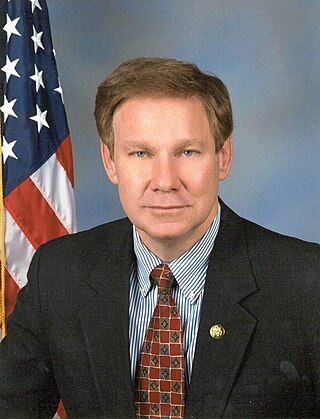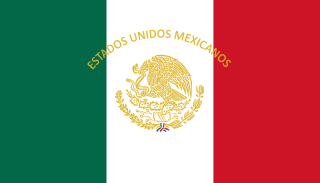This article needs additional citations for verification .(August 2017) |
 |
|---|
A number of elections on the federal and local level took place in Mexico during 2006. [1]
This article needs additional citations for verification .(August 2017) |
 |
|---|
A number of elections on the federal and local level took place in Mexico during 2006. [1]
A general election was held on Sunday, July 2, 2006. Voters went to the polls to elect, on the federal level:
The Federal Electoral Institute (IFE) is the public organization responsible for organizing the general election in Mexico.
In addition to the general election in July 2006, 12 states and the Federal District (Mexico City) held local elections during the course of the year.

The politics of Mexico function within a framework of a federal presidential representative democratic republic whose government is based on a multi-party congressional system, where the President of Mexico is both head of state and head of government. The federal government represents the United Mexican States and is divided into three branches: executive, legislative and judicial, as established by the Political Constitution of the United Mexican States, published in 1917. The constituent states of the federation must also have a republican form of government based on a congressional system as established by their respective constitutions.

The Libertarian Party (LP) is a political party in the United States that promotes civil liberties, non-interventionism, laissez-faire capitalism, and limiting the size and scope of government. The party was conceived in August 1971 at meetings in the home of David F. Nolan in Westminster, Colorado, and was officially formed on December 11, 1971, in Colorado Springs. The organizers of the party drew inspiration from the works and ideas of the prominent Austrian school economist, Murray Rothbard. The founding of the party was prompted in part due to concerns about the Nixon administration, the Vietnam War, conscription, and the introduction of fiat money.

The Institutional Revolutionary Party is a political party in Mexico that was founded in 1929 and held uninterrupted power in the country for 71 years, from 1929 to 2000, first as the National Revolutionary Party, then as the Party of the Mexican Revolution and finally as the PRI beginning in 1946.
Primary elections, or direct primary are a voting process by which voters can indicate their preference for their party's candidate, or a candidate in general, in an upcoming general election, local election, or by-election. Depending on the country and administrative divisions within the country, voters might consist of the general public in what is called an open primary, or solely the members of a political party in what is called a closed primary. In addition to these, there are other variants on primaries that are used by many countries holding elections throughout the world.

The National Action Party is a conservative political party in Mexico founded in 1939. The party is one of the main political parties in Mexico, and since the 1980s has had success winning local, state, and national elections.

Thomas Milburn Davis III is an American lobbyist and former Republican member of the United States House of Representatives who represented Virginia's 11th congressional district in Northern Virginia. Davis was considering a run for the U.S. Senate seat being vacated by five-term incumbent and fellow Republican John Warner in the 2008 election, but decided against it. He announced on January 30, 2008, that he would not seek reelection to an eighth term. Davis resigned from Congress on November 24, 2008.

Elections in Mexico are held every 6 years to elect a president and every 3 years to elect a legislature. These elections determine who, on the national level, takes the position of the head of state – the president – as well as the legislature.

John Joseph Henry Schwarz, is an American physician and independent politician from Michigan, who was elected to the United States House of Representatives in 2004 as a moderate Republican. He represented Michigan's 7th congressional district from January 2005 to January 2007.
Elections in Germany include elections to the Bundestag, the Landtags of the various states, and local elections.

General elections were held in Mexico on Sunday, 2 July 2006. Voters went to the polls to elect a new President of the Republic to serve a six-year term, replacing then President Vicente Fox ; 500 members of the Chamber of Deputies to serve for three-year terms; and 128 members of the Senate to serve for six-year terms.
An independent or non-partisan politician is a politician not affiliated with any political party or bureaucratic association. There are numerous reasons why someone may stand for office as an independent.

Marcelo Luis Ebrard Casaubón is a Mexican politician who served as the Secretary of Foreign Affairs of Mexico until 2023. Affiliated with the National Regeneration Movement (MORENA) since 2018, he was appointed to lead the foreign ministry by Mexican President Andrés Manuel López Obrador on 1 December 2018. On June 2023, he resigned from his post to compete for his party's presidential candidacy for the 2024 election.

The Instituto Nacional Electoral (INE) is an autonomous, public agency responsible for organizing federal elections in Mexico, that is, those related to the election of the President of the United Mexican States, the members of the Congress of the Union as well as elections of authorities and representatives at local and state levels. The agency's president is Guadalupe Taddei Zavala, appointed in 2023 for a 9-year tenure.
Americans for a Republican Majority was a political action committee formed by former Republican House Majority Leader Tom DeLay and directed by Karl Gallant. On July 7, 2006 ARMPAC reached an agreement with the Federal Election Commission to pay a fine of $115,000 for various violations and to shut down operations. It filed its termination papers on April 24, 2007.

John Bradley Ellsworth is an American politician who was the U.S. representative for Indiana's 8th congressional district from 2007 to 2011. In 2010, he was the Democratic candidate for a seat in the United States Senate, but he was defeated by Dan Coats, a former Senator, by 55% to 40%.

Gordon Harold Smith is an American politician, businessman, and academic administrator who served as a United States Senator from the state of Oregon. A Republican, he served two terms in the Senate from 1997 to 2009. On September 18, 2009, he was appointed president of the National Association of Broadcasters (NAB). As of 2022, he is the last Republican to represent Oregon in the Senate.

The New Alliance Party is a state-level political party in Mexico founded in 2005.

Mexico, officially the United Mexican States, is a country in the southern portion of North America. It is bordered to the north by the United States; to the south and west by the Pacific Ocean; to the southeast by Guatemala, Belize, and the Caribbean Sea; and to the east by the Gulf of Mexico. Mexico covers 1,972,550 km2, making it the world's 13th-largest country by area; with a population of over 126 million, it is the 10th-most-populous country and has the most Spanish speakers. Mexico is organized as a federal republic comprising 31 states and Mexico City, its capital. Other major urban areas include Monterrey, Guadalajara, Puebla, Toluca, Tijuana, Ciudad Juárez, and León.

The 2008 congressional elections in New Mexico were held on November 4, 2008 to determine New Mexico's representation in the United States House of Representatives. The party primary elections were held June 3, 2008. Martin Heinrich, Harry Teague, and Ben Ray Luján, all Democrats, were elected to represent New Mexico in the House. Representatives are elected for two-year terms; the winners of the election currently serve in the 111th Congress, which began on January 4, 2009 and is scheduled to end on January 3, 2011. The election coincided with the 2008 U.S. presidential election and senatorial elections.

The president of Mexico, officially the president of the United Mexican States, is the head of state and head of government of Mexico. Under the Constitution of Mexico, the president heads the executive branch of the federal government and is the commander-in-chief of the Mexican Armed Forces. The current president is Andrés Manuel López Obrador, who took office on 1 December 2018.